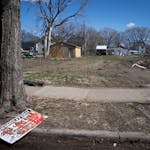It got so that he could spot what ailed them almost as soon as they walked through the door.
And each time, Resmaa Menakem, then a therapist working at U.S. military bases across Afghanistan, closed his office door and listened as combat-weary soldiers and civilian workers poured out their hurt.
Since moving to the Twin Cities, his work soothing tormented minds has continued. Only now, his clients include police officers, many of whom also suffer from post-traumatic stress disorder (PTSD).
Overseas, he heard about the constant rattle of insurgent gunfire and the makeshift bombs that regularly exploded in markets and outside restaurants and cafes. And he heard about what came next. Depression. Anxiety. Nightmares.
Here, he has continued to listen.
"We don't take care of police officers from a human point of view. A police officer will go from watching a baby getting killed, or domestic violence, to a hit-and-run where someone has a gaping wound," said Menakem, who sees patients at his artifact-lined office in Edina. "And no one is asking, 'How are you doing?' "
Last year, he started offering counseling services for the Minneapolis Police Department at the suggestion of Charles Adams, a top police commander and longtime friend. The goal: to teach department supervisors to recognize signs of stress in their officers and get them help.
At the same time, he also worked with black Americans suffering from race-based trauma, or the emotional distress a person may feel — sometimes vicariously — after encountering racial harassment or hostility, such as a police shooting.
Menakem, who refers to his work as "cultural somatics" and himself as a "soul medic," takes the approach that trauma lives in the body and can even be passed from one generation to the next, as demonstrated by the growing field of epigenetics — the science of how genes are turned on and off by external factors.
Cops, no matter their race, are no exception, he says. Every call an officer goes on can take a psychological toll, which adds up over time, he said.
Yet for decades the machismo nature of policing demanded that officers bury their feelings while they raced from crime scene to crime scene. Visiting a department therapist was regarded as a sign of weakness.
Kris Arneson, a former assistant police chief, said that many officers have a hard time recognizing signs of trauma, much less getting over it.
"We wanted the supervisors to see and to realize in their officers who they're supervising, if they're experiencing trauma, based on a call they went on or something else in their life," said Arneson, who retired last year after 32 years with the department.
Trauma's effects
Over the years, more and more police agencies have come to recognize how officers are affected by trauma — not just from major emergencies like a mass shooting, but also the daily grind of responding to service calls. Now, many departments offer help for cops who are having difficulties.
In Minneapolis, Police Chief Medaria Arradondo has promised to transform the department's culture "to realize that we recognize they're not robots, they're human beings." Last year, the city received a $750,000 grant from the International Association of Chiefs of Police (IACP), one of five U.S. cities chosen for a pilot program to "provide community outreach for collective healing and organization support for officer wellness." And Mayor Jacob Frey recently proposed allocating $150,000 for counseling to help officers "process what they encounter in the line of duty and recalibrate between calls."
A City Council subcommittee will meet this week to consider with north Minneapolis-based Brakins Consulting and Psychological Services to provide counseling for officers involved in tragic events.
Left untreated, trauma can lead to deeper problems both on the job and at home, experts say.
According to the nonprofit Badge of Life, which tracks police suicides through news reports and social media accounts, the suicide rate for officers (16 suicides per 100,000 people) outpaces the general population (13.5 per 100,000). Officers also tend to have more marital troubles than the general public and are more likely to suffer from PTSD or depression, studies have shown.
Menakem's approach recognizes that there is suffering on both sides of the divide between communities and police, resulting from intergenerational trauma related to systemic racism, said Vina Kay, executive director of Voices for Racial Justice.
"I don't think of that as excusing violence, but it helps us understand things," said Kay, who has attended Menakem's sessions. "He brings this new lens of paying attention to how our bodies respond to trauma."
Menakem, 53, puts his clients through a series of exercises designed to help them recognize how trauma affects their bodies and how to maintain calm during tense encounters with citizens through mindfulness. In one, he has officers stand with their backs against the wall and take a step forward every time they answer "yes" to a series of questions.
"It allows police officers to experience them not being the only ones that have had a traumatic experience," he said. "It allows them to begin to see some of the things that affect them, it's them and others, including leadership."
Libor Jany • 612-673-4064 Twitter: @StribJany




